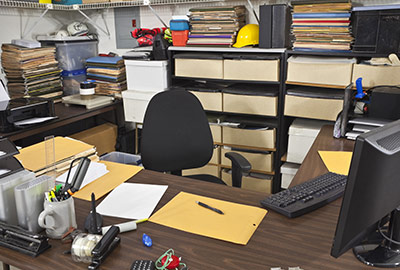Get the Extra Space You Need for Your Business with a Self-Storage Unit
Many people think of self-storage for residential uses, but self-storage can be an invaluable asset for large or small business uses as well.
Businesses of all sizes often have limited space and can easily become cluttered and overwhelmed by boxes of documents, products, equipment, unused office furniture, or seasonal products and displays. Self-storage is a great way to move things you don’t use on a daily basis out of your office space, giving you more usable space for other purposes. Clearing the clutter makes a better first impression on clients. Self-storage can also be a great short-term solution during remodeling, renovations, or while relocating.
Renting a self-storage unit is typically significantly less expensive than renting additional office, retail, or warehouse space. It can save your business hundreds to thousands of dollars each month. In addition, the lease is month-to-month so you are not locked into a long-term commitment. If your business grows and you find yourself in need of more space, you can simply move to a larger unit. If your business is primarily a mobile business, requiring you to spend very little time in an actual office, such as a plumber, electrician, or other on-site service, a self-storage unit may actually save you from having to rent an office.
Some careful planning can help you make the most of your self-storage unit. AAA Storage of Lansing recommends the following:
- To determine what size of unit you need, create a spreadsheet of everything you need to store in your unit. Not only will this help you figure out your space needs and help you select the perfect unit, but it will also give you a great start on an inventory of your unit. Be sure to select a unit with enough space to leave room to walk to the back of the unit and access everything. AAA Storage of Lansing’s Resident Manager can help you choose the right size unit for your needs.
- Determine if you need a unit with climate control; heated in the winter and cooled in the summer. This will depend on what you are storing in the unit. Computer equipment, furniture, documents, and pharmaceutical products are examples of items that warrant climate control. A good rule of thumb is if the items could be stored outdoors or in a garage, you probably don’t need a climate controlled unit.
- Take the time to carefully organize everything when you move into your unit. Put the items you need to access frequently near the front of the unit. Shelving units can help you make use of the vertical space in your unit while still allowing easy access to items placed down low. Label everything. Create a map and keep a copy at the front of the unit so anyone accessing the unit can easily find what they’re looking for.
- Keep a careful inventory of what you have stored in your unit. Make sure that anyone who accesses the unit updates the inventory so you know what you have and what items may be running low.
- Just as you would insure your office space and contents, you should also insure the contents of your self-storage unit.

